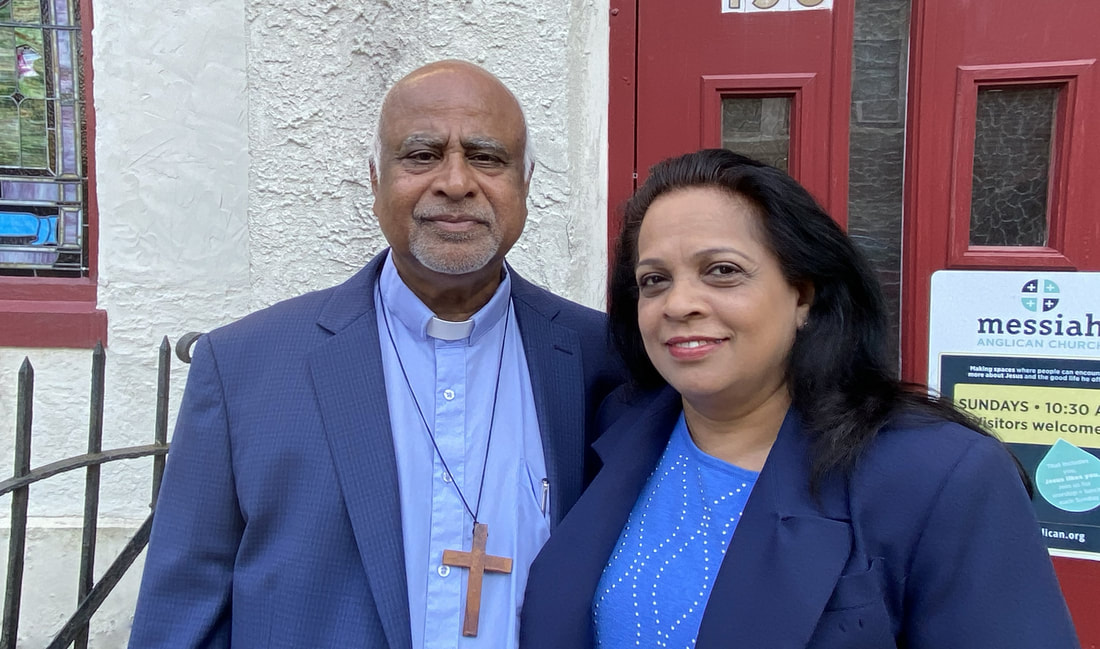Our People
Rev. Dr. Thomas V. Thomas
Dr. Thomas has extensive experience and training in Christian ministry including chaplaincy and grief support, church planting, philosophy, pastoral care, counseling, and psychology. He has served churches, nonprofits, and hospitals in several countries since he was a young man, and he is the author of several books. At Messiah he is providing pastoral ministry and preaches regularly. He is available in person and online for counseling. He and his wife Anna live in Philadelphia.
|
Diocesan Leadership
Our bishop is the Rt. Rev. Julian Dobbs, and Messiah Anglican Church is part of the Diocese of the Living Word in the Anglican Church in North America.
Lay Leadership
Messiah Anglican Church is led by a board called a Vestry.
Search ProcessMessiah is in a search process for a church planter. If you think God may be calling you to help us serve the people of Philadelphia, please begin the process by contacting the ADLW diocesan office.
|
More about us
It’s right there in the name: Messiah Anglican Church
Messiah. Everything we do is centered around Jesus Christ the Messiah. He is both the risen Lord of the world and the Lord of all of life, in each of our lives. That means that Jesus is the one who determines our identity—not our sins, not our troubles, not our desires, not our economic status, not our nationality or ethnicity. We are set free from enslavement to these things by Jesus’ redemption and the hope of the resurrection. We are all one in Christ Jesus.
How do we know about Jesus? The Bible, God’s written word to us. We are meant to read, mark, learn and inwardly digest the Holy Scriptures, which contain all things necessary for salvation. The Bible is how we know who Jesus is, what he has done, and what he commands us to do.
How do we worship Jesus? In the liturgical pattern established by the Book of Common Prayer. Currently we use the BCP 2019 for most services and often draw on the 1662 International Edition.
Why the BCP? Because the regular services all contain what J. I. Packer described as a “sequence of three themes: first, the detecting and confessing of sin; second, the announcing of grace, in God’s promise to pardon and restore the penitent through Christ; third, the exercising of faith, first in believing God’s promise and trusting him for pardon, and then in acts of praise, testimony, intercession, and obeying instruction, all based on the prior restoring of fellowship with God through forgiveness. All the main Prayer Book services have this built-in evangelical design.”
As we worship and practice obedience to Jesus together, shaped by this liturgical pattern and the sustained study of the Bible, the Holy Spirit works in our hearts so that we can show the fruit of repentance, build one another up, and share the good news about Jesus with our families, friends, and neighbors.
Anglican. We are aligned with the historic Anglican faith as expressed in the creeds and the Thirty Nine Articles: Biblical, reformed, liturgical, and global. We believe the ACNA College of Bishops’ Pastoral Statement on Sexuality and Identity provides critical guidance on issues central to our humanity.
Church. We are (for the present) a small parish, yet we are also part of what C. S. Lewis called the Church “spread out through all time and space and rooted in eternity, terrible as an army with banners.” But what does that look like in northwest Philadelphia in these early years of the 21st century?
Our vision and mission at Messiah is to live as a robust community of faithful Christians, proclaiming the Gospel, baptizing and making disciples, bearing one another’s burdens, taking joy in our friendship and love, and catechizing our children to put on the whole armor of God as they grow to faith in a culture increasingly hostile to those who are called according to His purpose. We can do this with hopeful hearts and know that our labor is not in vain because everything we do is centered on Jesus Christ the Messiah.
He is the image of the invisible God, the firstborn of all creation. For by him all things were created, in heaven and on earth, visible and invisible, whether thrones or dominions or rulers or authorities—all things were created through him and for him. And he is before all things, and in him all things hold together. And he is the head of the body, the church. He is the beginning, the firstborn from the dead, that in everything he might be preeminent. For in him all the fullness of God was pleased to dwell, and through him to reconcile to himself all things, whether on earth or in heaven, making peace by the blood of his cross. —Colossians 1:15–20
We gladly welcome you to come worship our great savior with us!
Messiah. Everything we do is centered around Jesus Christ the Messiah. He is both the risen Lord of the world and the Lord of all of life, in each of our lives. That means that Jesus is the one who determines our identity—not our sins, not our troubles, not our desires, not our economic status, not our nationality or ethnicity. We are set free from enslavement to these things by Jesus’ redemption and the hope of the resurrection. We are all one in Christ Jesus.
How do we know about Jesus? The Bible, God’s written word to us. We are meant to read, mark, learn and inwardly digest the Holy Scriptures, which contain all things necessary for salvation. The Bible is how we know who Jesus is, what he has done, and what he commands us to do.
How do we worship Jesus? In the liturgical pattern established by the Book of Common Prayer. Currently we use the BCP 2019 for most services and often draw on the 1662 International Edition.
Why the BCP? Because the regular services all contain what J. I. Packer described as a “sequence of three themes: first, the detecting and confessing of sin; second, the announcing of grace, in God’s promise to pardon and restore the penitent through Christ; third, the exercising of faith, first in believing God’s promise and trusting him for pardon, and then in acts of praise, testimony, intercession, and obeying instruction, all based on the prior restoring of fellowship with God through forgiveness. All the main Prayer Book services have this built-in evangelical design.”
As we worship and practice obedience to Jesus together, shaped by this liturgical pattern and the sustained study of the Bible, the Holy Spirit works in our hearts so that we can show the fruit of repentance, build one another up, and share the good news about Jesus with our families, friends, and neighbors.
Anglican. We are aligned with the historic Anglican faith as expressed in the creeds and the Thirty Nine Articles: Biblical, reformed, liturgical, and global. We believe the ACNA College of Bishops’ Pastoral Statement on Sexuality and Identity provides critical guidance on issues central to our humanity.
Church. We are (for the present) a small parish, yet we are also part of what C. S. Lewis called the Church “spread out through all time and space and rooted in eternity, terrible as an army with banners.” But what does that look like in northwest Philadelphia in these early years of the 21st century?
Our vision and mission at Messiah is to live as a robust community of faithful Christians, proclaiming the Gospel, baptizing and making disciples, bearing one another’s burdens, taking joy in our friendship and love, and catechizing our children to put on the whole armor of God as they grow to faith in a culture increasingly hostile to those who are called according to His purpose. We can do this with hopeful hearts and know that our labor is not in vain because everything we do is centered on Jesus Christ the Messiah.
He is the image of the invisible God, the firstborn of all creation. For by him all things were created, in heaven and on earth, visible and invisible, whether thrones or dominions or rulers or authorities—all things were created through him and for him. And he is before all things, and in him all things hold together. And he is the head of the body, the church. He is the beginning, the firstborn from the dead, that in everything he might be preeminent. For in him all the fullness of God was pleased to dwell, and through him to reconcile to himself all things, whether on earth or in heaven, making peace by the blood of his cross. —Colossians 1:15–20
We gladly welcome you to come worship our great savior with us!



